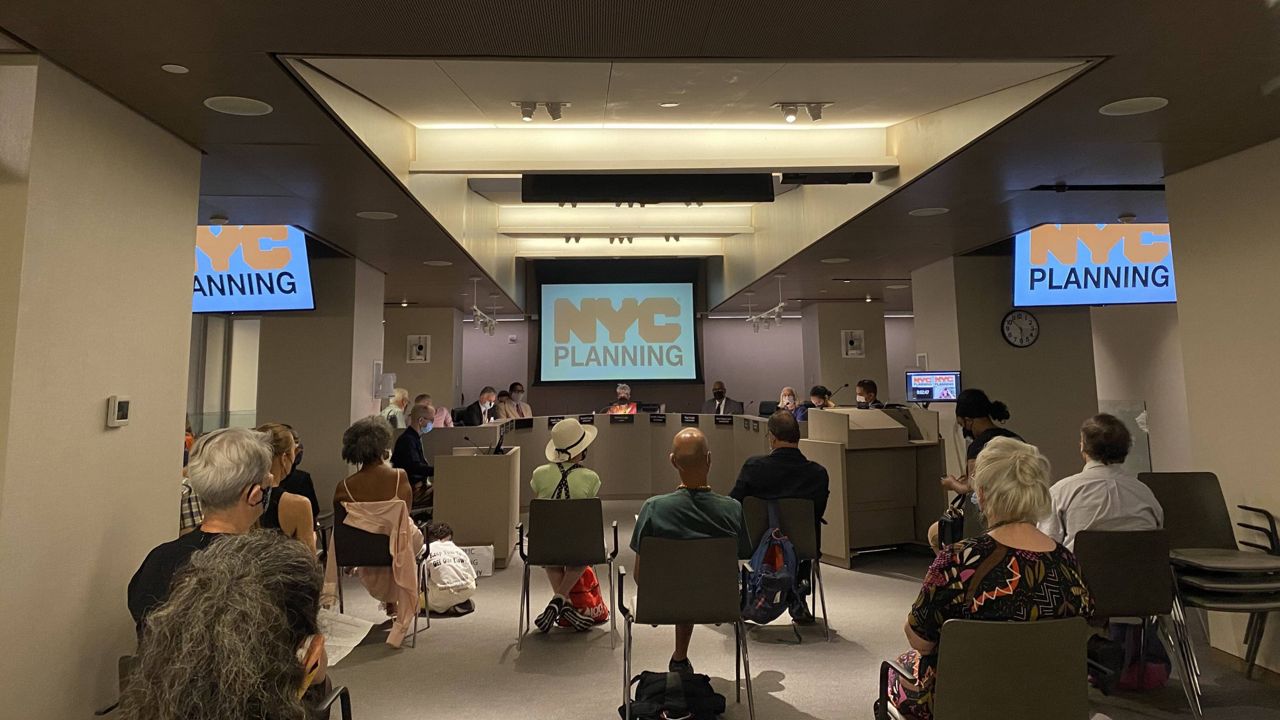A boisterous and impassioned crowd gathered at a city Planning Commission hearing Thursday to fight a residential development proposal that they say would cast shadows on the Brooklyn Botanic Garden as the developer submitted an 11th-hour alternate plan.
The public hearing marks a critical juncture in a land use review process that began in 2018 when the Manhattan-based Continuum Company submitted plans to the city to build two residential towers as high as 34 stories near the perimeter of the 110-year-old garden.
It has faced major pushback from the community, including a rejection from Community Board 9, opposition from City Council members like Speaker Corey Johnson and Majority Leader Laurie Cumbo, who represents the area and holds a crucial vote, and lawsuits from local activists.
Mayor Bill de Blasio last December called the project “grossly out of scale with the neighborhood.”
In a last-minute move, developer Ian Bruce Eichner of Continuum Company submitted an alternate proposal for the towers Thursday morning, which would cap them at 17 stories.

“We got a little bit blindsided by this new alternative proposal with no details that was presented this morning by the developer, but the City Planning Commission was equally blindsided,” said Adrian Benepe, president of the botanic garden and a former city parks commissioner.
The planning commission has until Sept. 22 to vote on the plan and will likely hold a public review session in the coming weeks to consider whether the new proposal will be included in this current review process.
The last-minute move was viewed cynically by opponents.
“[The developers] recognize that the opposition to this project is very strong and the commission's review session on Monday has certainly indicated that the commission itself has some serious questions about it,” said Elizabeth Goldstein, president of the Municipal Art Society of New York. “I think that they just took advantage of being in this final moment of the public review process to come forward with another proposal.”
Forty-five people spoke out in opposition to the project on Thursday, both in person and remotely. Only seven people spoke in favor of it.
“This project would create irreparable harm to the garden,” Marvin Siporin, a longtime Brooklyn resident, said at the hearing. “[This] would destroy the garden.”
“By shading out hours of sunlight to the garden’s most sun-dependent collections, the proposed towers would deal a mortal blow to our nurseries and conservatives where [the Brooklyn Botanic Garden] propagates and displays plants from around the world,” said Diane Steinberg, chair of the garden’s board of trustees, who provided testimony remotely at the hearing.
Opponents argue that not only would the shadows cast by the two towers devastate the garden, but also that the density and height of the luxury units would be out of scale with the brownstone-lined neighborhood.
Eichner says the project will add to the city’s demand for affordable housing. Half of the planned 1,578 units are set to be below market rate.
“In order to achieve the level of affordability with spectrums of income reflecting the needs of New York City’s working and middle-class residents, the project requires the density that would allow us to achieve that objective,” Eichner said at the hearing. “Our proposal would truly generate an unprecedented supply of permanently affordable housing.”
In 1991, the area was rezoned to protect the Brooklyn Botanic Garden and neighborhood character, limiting development to a maximum of seven stories.
Neighbors also fear a zoning change would set a precedent.
“It is the project that is illustrating to all of us how badly our environmental review processes actually take into account the impacts of access to sunlight and open space across the city of New York,” Goldstein said.
Goldstein said shadow impacts are largely ignored in environmental reviews and argued that they should play a more important role than they have in the past.
In February, Marisa Lago, director of the Department of City Planning and chair of the City Planning Commission, expressed concerns over the proposal during a review session.
“The private applicant is seeking way too much density for this site, leading to an overbearing envelope with no precedent and a development that’s grossly out of scale with the surrounding context,” Lago said at the time.
Commission approval would move the proposal to the City Council. A rejection by the commission halts the project.
Borough President Eric Adams, and the Democratic nominee for mayor, has yet to disclose his recommendation on the proposal.



